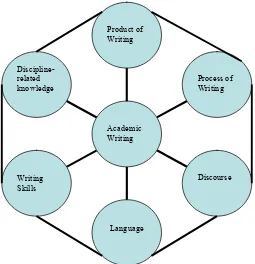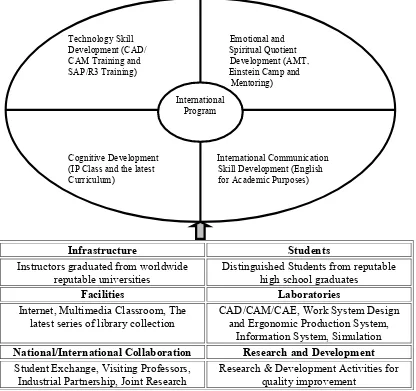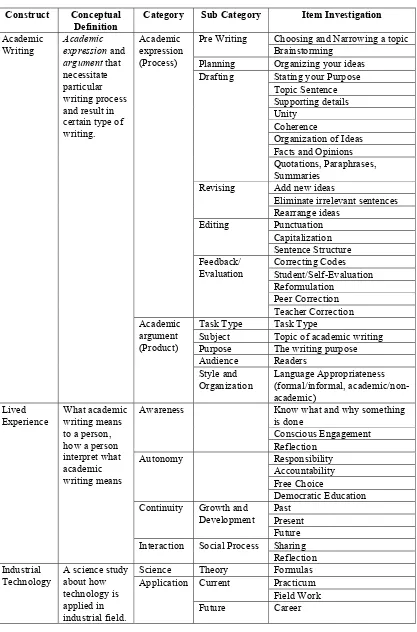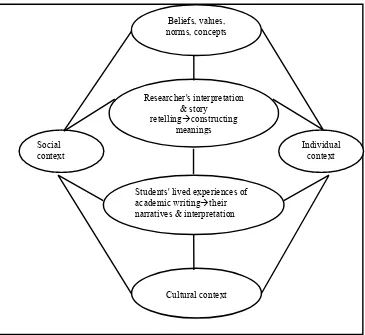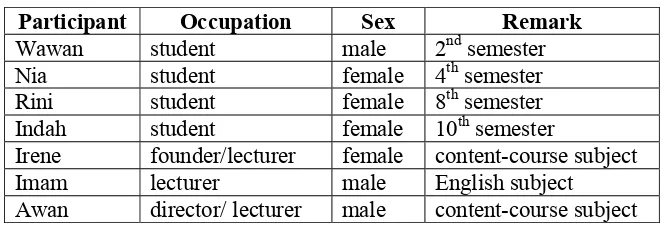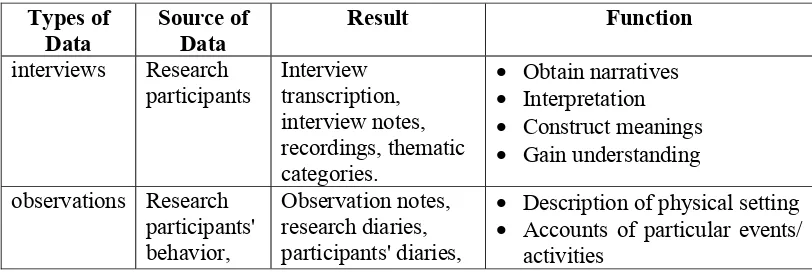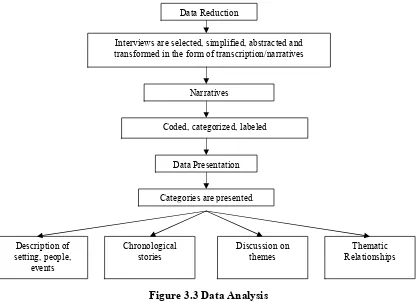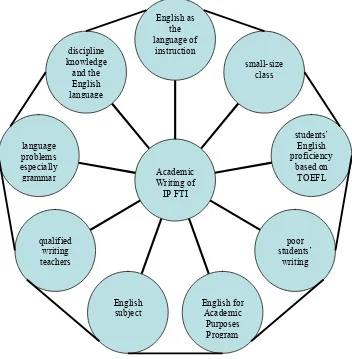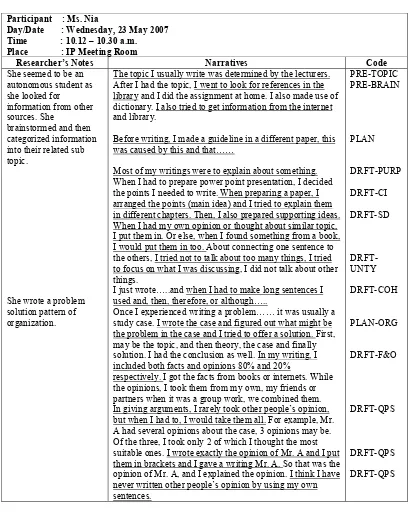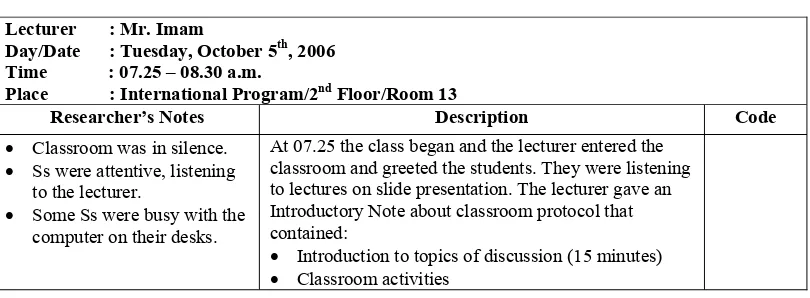ACADEMIC WRITING EXPERIENCE OF UNDERGRADUATE
STUDENTS OF INDUSTRIAL TECHNOLOGY
A THESIS
Presented as a Partial Fulfillment of the Requirements to Obtain the Magister Humaniora (M.Hum) Degree
in English Language Studies
by
ISTA MAHARSI Student Number: 056332006
THE GRADUATE PROGRAM IN ENGLISH LANGUAGE STUDIES SANATA DHARMA UNIVERSITY
A THESIS
ACADEMIC WRITING EXPERIENCE OF UNDERGRADUATE
STUDENTS OF INDUSTRIAL TECHNOLOGY
by
ISTA MAHARSI
Student Number: 056332006
Approved by
Dr. J. Bismoko August 1, 2007
A THESIS
ACADEMIC WRITING EXPERIENCE OF UNDERGRADUATE
STUDENTS OF INDUSTRIAL TECHNOLOGY
Presented by
ISTA MAHARSI
Student Number: 056332006
Defended before the Thesis Committee and declared acceptable.
THESIS COMMITTEE
Chairperson : DR. B.B. Dwijatmoko, M.A. _________________
Secretary : DR. F.X. Mukarto, M.S. _________________
Members : 1. DR. J. Bismoko _________________
: 2. DR. Retno Muljani, M.Pd. _________________
Yogyakarta, September 29, 2007
The Graduate Program Director
Sanata Dharma University
STATEMENT OF ORIGINALITY
This is to certify that all ideas, phrases, sentences, unless otherwise stated, are the ideas, phrases, and sentences of the thesis writer. The writer understands the full consequences including degree cancellation if she took somebody else's ideas, phrases, or sentences without proper references.
Yogyakarta, August 1, 2007
ACKNOWLEDGEMENTS
I would like to thank my Supervisor, DR. J. Bismoko, for his much-appreciated assistance and encouragement during my study and the writing of this thesis. I am also grateful to all Master Program lecturers at Sanata Dharma University: DR. B.B. Dwijatmoko, M.A., DR. F.X. Mukarto, M.S., DR. Retno Muljani, M.Pd., DR. Novita Dewi, M.A., and Dra. Sri Mulyani, M.A.
A particular thank to Ir. Ira Promasanti, M.Eng.Sc. and Ir. Agus Mansur, M.Eng.Sc. for their fruitful collaboration and valuable assistance throughout the writing of this thesis. My profound gratitude goes to Mbak Diana, the International Program’s secretary for her assistance and kindness.
I am deeply indebted to my research participants and all students of International Program of Industrial Technology UII for their willingness and very much appreciated help without which this thesis would never be completed. Thank you very much.
I would like to thank my beloved husband for his endless encouragement and valuable comments on my writing. He is always the one who loves me, guides me, supports me and teaches me to become a better person. I also thank my cute son, Muhammad Aulia Rahman and my sweet daughter, Nahla Sania Ulya. You have been so wonderful children to me and always become the spirit of my life.
I would like to thank to my colleagues at CILACS: Irma, Ratna, Ririn, Yusfa, Mia, Mey, Muti and all CILAXERS for the good time at CILACS and the sharing of frustrations and of the success. You are my truly friends and you have been fulfilling my days with joyful memories.
TABLE OF CONTENTS
TITLE PAGE………... i
APPROVAL PAGE……….… ii
DEFENSE APPROVAL PAGE………..……… iii
STATEMENT OF ORIGINALITY……… iv
ACKNOWLEDGEMENTS..……… v
TABLE OF CONTENTS………...……..… vii
LIST OF TABLES………...…… x
LIST OF FIGURES………..…… xi
LIST OF BOXES……….…… xii
LIST OF APPENDICES………..……… xiii
LIST OF ABBREVIATIONS……… xv
ABSTRACT……….…… xvii
ABSTRAK……….……. xviii
CHAPTER I INTRODUCTION……….…… 1
A. BACKGROUND……….……… 1
B. PROBLEM IDENTIFICATION……….……… 5
C. PROBLEM LIMITATION……….…… 7
D. PROBLEM DELIMITATION………..……….….…… 8
E. RESEARCH QUESTION……….…..… 9
F. RESEARCH GOALS AND OBJECTIVES……….….. 9
G. RESEARCH BENEFITS………...….. 10
CHAPTER II LITERATURE REVIEW ………..………..…… 12
A. THEORETICAL REVIEW……….……… 12
1. Construct……….…… 12
a. Academic Writing Experience…..………..… 13
1) Writing………...…….…..… 13
2) Academic Discourse………..…...…… 15
3) Academic Writing………..…….…..… 16
4) Experience………. 21
5) Academic Writing Experience……….. 24
1) Vision and Mission………..… 26
2) Education Systems of International Program…….….…… 26
3) Facilities and Learning Process………..…… 27
4) Management and Resources……… 30
2. Related Research……….……….….. 30
B. THEORETICAL FRAMEWORK………..… 36
CHAPTER III METHODOLOGY………..….…. 41
A. RESEARCH DESIGN……… 41
B. SETTING………...…….… 47
C. RESEARCH PARTICIPANTS……….…. 49
D. TYPES OF DATA AND DATA SOURCE………...….…... 52
E. DATA COLLECTION TECHNIQUE………..……….… 53
F. TECHNIQUE OF DATA ANALYSIS………...……….….. 60
CHAPTER IV ANALYSIS……….………….….. 63
A. DATA PRESENTATION ………. 63
1. Preliminary Interview……… 64
2. In-depth Interview ……….………..….. 65
a. Unstructured Interview………..… 67
b. Structured Interview………..… 68
3. Observation ……..……….……….…… 69
4. Documents……….…. 72
5. Coding and Thematizing……….…… 73
B. DISCUSSION AND INTERPRETATION……….…… 78
1. Pre-figured Themes……….………...…..…... 79
a. Process of Writing………..…………..…….. 79
1) Pre-Writing………..……….. 79
2) Planning……….….…… 82
3) Drafting……….………. 84
4) Revising……….…. 95
5) Editing……… 96
6) Feedback and Evaluation……….….. 98
1) Task Type, Subject, Purpose, and Audience ……… 107
2) Style and Organization……….……… 113
2. Emergent Categories……….………. 116
a. Self (Current and Future)………. 116
b. Resources/Learning Materials………..………… 128
C. FINDINGS……….………. 134
D. OTHER FINDINGS………..……….. 137
CHAPTER V CONCLUSION, SUGGESTION AND RECOMMENDATION 138 A. CONCLUSION………..….…. 138
B. IMPLICATION...………. 141
C. RECOMMENDATION……… 143
BIBLIOGRAPHY……….. 146
LIST OF TABLES
Table 2.1 Table 3.1 Table 3.2 Table 4.1 Table 4.2 Table 4.3 Table 4.4 Table 4.5 Table 4.6 Table 4.7
Research Construct Mapping……….. Research Participants………... Types and Sources of Data (adapted from Holliday Model, 2002)…. Data-Presentation Sample of Unstructured Interview with Ms. Rini... Data-Presentation Sample of Structured Interview with Ms. Nia…… Data-Observation Sample……… Participant Diary Sample……… Illustrated List of Codes………. Illustrated List of Emergent Themes……….. Illustration of Further Coding……….
LIST OF FIGURES
Figure 2.1 Figure 2.2
Figure 3.1
Figure 3.2 Figure 3.3 Figure 4.1
Complexities of Problems……….…... International Program Education Systems (Panduan Akademik Fakultas Teknologi Industri)……….. Building a Picture of Researcher, Participants and the Context (adapted from Holliday Model, 2002)………. Types of Data ………..………. Data Analysis……….. Initial Issues of Academic Writing of IP FTI……….
21
28
LIST OF BOXES
Box 4.1 Box 4.2
Box 4.3 Box 4.4 Box 4.5 Box 4.6 Box 4.7 Box 4.8
Ms. Indah’ Sample Writing Showing Unity and Coherence………….. Mr. Wawan and Ms. Rini’s Sample Writing Showing Unity and Coherence………..… Ms. Indah’s Sample of Field Work Report ……… Lecturer’s Correction on Ms. Rini’s Assignment………... Field Work Report Sample of Ms. Indah……… Ms. Nia’s Summary Assignment Sample……… Ms. Rini’s Thesis Proposal Sample………. Mr. Wawan’s Laboratory Report Sample……..……….
88
LIST OF APPENDICES
Appendix A Letter of Reference from Sanata Dharma University………….. 153
Appendix B 1. Interview Question Blueprint for Student Participants….… 154 2. Interview Question Blueprint for Lecturer Participants…… 156
Appendix C Interview Protocol…... 157
Appendix D Preliminary Interview with Ms. Irene………. 158
Appendix E Interviews………..………. 159
1. Unstructured Interviews……….. 159
a. Mr. Wawan……… 159
b. Ms. Nia……….. 164
c. Ms. Rini………. 169
d. Ms. Indah………. 172
e. Ms. Irene………. 175
f. Ms. Awan……… 181
g. Ms. Imam……… 186
2. Structured Interviews………. 192
a. Mr. Wawan………. 192
b. Ms. Nia……… 195
c. Ms. Rini……… 199
d. Ms. Indah………. 202
e. Ms. Awan………. 204
Appendix F Participant Journal/Diary……….. 209
Appendix G Observation Reports………..…... 211
1. Mr. Imam’s Class……….. 211
2. Mr. Awan’s Class………. 213
3. Ms. Irene-Mr.Anhar’s Class……… 215
Appendix H Documents……….. 216
1. a. Wawan’s Assignment (Eng-English)……….. 216
b. Wawan’s Assignment (Laboratory Report)…………. 217
3. a. Ms. Rini’s Assignment (Thesis Proposal)………. 219 b. Ms. Rini’s Assignment Thesis Proposal)……….. 220 c. Ms. Rini’s Assignment (FWR-Field Work Report)….. 221 4. a. Ms. Indah’s Assignment (FWR-Field Work Report)… 222
LIST OF ABBREVIATIONS
Drafting Facts and Opinions Drafting Controlling Ideas Drafting Organization Drafting Purpose
Drafting Quotation, Paraphrase, Summary Drafting Supporting Details
Drafting Unity
English for Academic Purposes English for Specific Purposes Editing Capitalization
Editing Punctuation Editing Sentence Structure English for Specific Purposes
Feedback and Evaluation Teacher Correction Feedback and Evaluation Correcting Codes Feedback and Evaluation Grammar
Feedback and Evaluation Peer Correction Feedback and Evaluation Reformulation Feedback and Evaluation Self-Evaluation Fakultas Teknik Industri
International Program Kerja Praktek
Management Information System
Metodologi Penelitian/Research Methodology Course Planning
Pre-writing Brainstorming Pre-writing Topic
Purpose
Real Time Data Processing 3 Researcher’s Notes
Revision Add Sentences
Revision Eliminate Irrelevant Sentences Revision Rearrange Ideas
UNDP UNSW WRIT CLSS WUS
United Nation of Development Program University of New South Wales
Writing Class
ABSTRACT
Ista Maharsi. 2007. Academic Writing Experience of Undergraduate Students of Industrial Technology. Yogyakarta: Sanata Dharma University.
The importance of academic writing of students at universities becomes more visible with the flourishing of international programs that impose students to be able to read, write and communicate in English within various content courses. This study discusses the academic writing experiences of the undergraduate International Program (IP) students of Industrial Technology at Islamic University of Indonesia. Specifically this study investigates what the students think of academic writing, how they give meaning to academic writing, how they interpret academic writing, and how they actualize themselves through academic writing.
This research is designed to be progressive qualitative research. The data presentation and analysis were based on the narratives of the research participants. Like those of narrative inquiries, the narratives here were used to seek profound meanings of individual perception and meaningful experience on academic writing that was most likely to be conveyed and obtained with high regard of more humanistic and holistic point of views. Thus, tangible stories, rich experiences, diverse perceptions, and multifaceted interpretation of academic writing of each participant would together construct meanings.
The participants were the IP students of semester II, IV, VIII, X and three lecturers. The data were taken from in-depth interviews (unstructured and structured interviews) with the participants, class observations and document collection. The data were recorded, video taped, and some documents were scanned. They were analyzed through a recursive process of transcribing, coding, categorizing as well as selecting and reducing. Accordingly, the pre-figured themes of both processes and products of writing were discussed. However, emergent categories were also presented as they were in no way less significant.
This research found that students of IP FTI experienced the stages of writing process with limited knowledge of writing skills, limited exposures of reading materials of their discipline, and inadequate feedbacks. The students perceived academic writing as part of their academic tasks that would be useful for their future career. Students are aware of this importance of academic writing; however, not all students could take necessary steps to improve it. The findings of this study were expected to be useful for better understanding of students’ academic writing perspectives, which in turn will be beneficial for the students to improve their academic writing performance. The implications of the findings will be suggested learning activities, qualified resources and material development with thoughtful regard to students’ autonomy and empowerment. Or else, other pedagogical suggestions may become emergent from the current study.
ABSTRAK
Ista Maharsi. 2007. Academic Writing Experience of Undergraduate Students of Industrial Technology. Yogyakarta: Sanata Dharma University.
Pentingnya academic writing bagi para mahasiswa menjadi semakin nyata dengan banyak bermunculannya program-program internasional yang menuntut para siswanya untuk bisa membaca, menulis dan berkomunikasi dengan bahasa Inggris dalam berbagai mata kuliah disiplin. Riset ini membahas tentang pengalaman academic writing mahasiswa International Program Fakultas Teknik Industri Universitas Islam Indonesia (IP FTI UII). Secara spesifik, riset ini menginvestigasi tentang bagaimana mereka memaknai academic writing, bagaimana mereka menginterpretasi academic writing, dan bagaimana mereka mengaktualisasikan diri melalui academic writing.
Riset ini didisain sebagai progresif kualitatif. Presentasi data dan analisa bersumber pada naratif para riset partisipannya. Seperti juga syarat-syarat naratif, naratif dipakai untuk mencari makna terdalam dari persepsi individu dan pengalaman yang bermakna dengan menjunjung tinggi nilai-nilai kemanusiaan. Oleh karenanya, cerita yang saling berkaitan, pengalaman yang kaya, persepsi yang berbeda-beda dan interpretasi berlapis akan bersama-sama membangun arti.
Para partisipannya adalah mahasiswa semester II, IV, VIII, X dan tiga dosen. Data diambil dari in-depth interview (terstruktur dan tidak terstruktur), observasi kelas, dan pengumpulan dokumen. Data tersebut kemudian direkam, di video kamera, dan beberapa dokumen di-scan. Data tersebut dianalisa melalui proses berulang-ulang dari mentranskrip, memberi kode, mengkategorisasi, menyeleksi dan menguranginya. Dengan demikian, tema-tema yang telah dipetakan sebelumnya serta kategori-kategori lain didiskusikan.
Adapun temuan riset ini adalah bahwa para mahasiswa IP FTI melalui tahap-tahap menulis dengan berbagai keterbatasan pengetahuan, keterbatasan materi bacaan yang berhubungan dengan jurusannya serta keterbatasan feedbacks (koreksi) dari pengajar. Mahasiswa memaknai academic writing sebagai bagian dari tugas akademik yang akan bermanfaat bagi masa depan mereka. Mahasiswa sadar akan pentingnya academic writing, namun tidak semua mahasiswa dapat mengambil langkah-langkah penting untuk memperbaiki potensi diri. Hasil riset ini diharapkan bermanfaat untuk memahami perspektif mahasiswa terhadap academic writing yang pada akhirnya akan bermanfaat untuk meningkatkan kemampuan akademis mereka. Implikasi hasil riset ini berupa aktifitas belajar, sumber daya yang berkualitas, karakter dasar tugas serta pengembangan materi dengan berorientasi otonomi dan pengayaan mahasiswa. Saran ilmiah lain dimungkinkan muncul dalam riset ini.
CHAPTER I INTRODUCTION
This research aimed to investigate the participants’ experiences in academic writing at the undergraduate level. It attempts to reveal the students’ understanding on academic writing within the industrial technology discourse and how they give meanings to it.
This chapter is organized as follows. Sections A and B discuss the research background and problem identification, respectively. While section C offers problem limitation, section D provides problem delimitation. Subsequently, sections E, F and G outline research questions, research goals and objectives, and research benefits, respectively.
A. BACKGROUND
The issue of academic English mastery, both written and spoken, in higher education becomes more apparent than ever before. The trend of academic writing needs in Europe, for example, is becoming more visible, because the European students mostly enter universities without sufficient knowledge of and experiences in academic writing (Bruce, 2005). Similarly, Zhu (2004) found that writing plays an important role in the real world communication.
academically, higher education students should possess a good command of the English communication skill and good mastery of particular subject matters.
Further, the flourishing of the English for Specific Purposes (ESP) with local adaptation and the English for Academic Purposes (EAP) implemented in non-English Department programs has strengthened this tendency. The development of the ESP branches such as English for Science and Technology has helped generate awareness of the importance of academic writing among academicians. This is despite the fact that the impact of the development of English for Science and Technology Program on non-native speakers has not been satisfactory (Swales, 1988).
In the academic context of science and technology, writing has been an important part of academic requirements. Some examples of academic tasks where writing plays a major role are assignments, examinations, and thesis. These academic tasks serve as means for students to express and communicate their ideas and arguments. Consequently, to be able to handle those academic tasks in English satisfactorily, students should have a good command of writing skills. For this purpose, such program as the English for Science and Technology is designed to help students survive and succeed in the academic environment (Swales, 1988). Likewise, this program is intended to meet the increasing demand for higher education standard competencies in which university graduates are expected to be able to communicate their ideas in good writing.
“Professionals in all disciplines do an enormous amount of writing on the job, even though their college curriculum may have included little or no course work in professional writing. Engineers write proposal for bids, chemists write articles describing their research, lawyers write legal briefs and sociologists write case studies. Many of these professionals do not necessarily like to write, but most of them have learned over the years to do an acceptable job.”
These facts show that writing is a part of job responsibilities upon which one’s career development relies. University graduates will enter the job markets with challenging requirements. They have to be able to communicate their thoughts orally and in writing in the most effective way to win the jobs.
More job opportunities such as becoming consultants, project managers, company presidents or Chief Executive Officers are becoming accessible for Industrial Engineers. Consequently, interests in studying in the field of Industrial Technology are growing significantly along with the development of technology itself. Published in Jobs-Rated Almanac is industrial engineering highest level of career satisfaction among traditional engineering disciplines (Pennsylvania State, The Harold and Marcus Inge Department of Industrial and Manufacturing Engineering). This, in turn, brings about a tougher and stricter working competition on the one hand and heavier career responsibilities of industrial engineers on the other.
solution to those issues, and communicating effectively their ideas both orally and in writing need to be integrated in the day-to-day teaching processes.
For that reason, I am interested in investigating the students’ experience of academic writing in the field of Industrial Technology at the undergraduate level. I choose the International Program of Industrial Technology Faculty of Islamic University of Indonesia (henceforth IP FTI UII) as the setting, because English is used as the only language of instruction in its entire learning activities. I suspect that its students encounter various problems unique to that environment that may range from the available resources, curriculum, language proficiency, learning quality, and supporting language environment. I consider that this uniqueness is worth researching.
In particular, I am of the view that students likely encounter problems that do not merely come from their disciplines, but also from their communication skills that include the English academic speaking and writing skills. This is why Allen regards language as an important communication aspect of study subjects (in Swales, 1998). The fact that they need to express themselves in both their current academic environment and their future workplaces as professionals reinforces the need to master the English communication skills. Therefore, both learning English communication skills and learning the core contents of the field of study are equally necessary. They strengthen each other.
patience due to the writing’s recursive process. Importantly, persistence and repeated practices are the keys to success. Therefore, writing in English is highly challenging.
This thesis will discuss academic writing experience of the undergraduate students’ of the IP FTI UII. How the students think about the academic writings in English, how they understand the nature of the tasks, how they execute their writing tasks, and how they would respond to the lecturers’ feedbacks will be examined. Similarly, the product of their writing will also be addressed to obtain a better and thorough picture of academic writing in the industrial technology context.
The results of this study will likely provide a better understanding of the academic writing experience of the undergraduate students of the IP FTI UII. In addition, the students’ perception and my own interpretation will be synthesized to construct a comprehensive description and interpretation of the academic writings in the Industrial Technology context.
As far as this research is concerned, no similar studies at the undergraduate level seem to have been previously conducted. Most research on academic writing of science and technology deal with overseas students (Braine, 1989; Zhu, 2004; Cotteral and Cohen, 2003; Jackson, Meyer and Parkinson, Currie, 1993; Swales, Barks, Ostermann and Simpson, 2001). There could be some research within the field of Industrial Technology of Indonesian students, but to the best of my knowledge, none makes use of the international program as the setting.
B. PROBLEM IDENTIFICATION
Investigations on the writers may embrace what and how the writers write or what the writers do in different situations and cultural background. In addition, readers may be examined on what they look for in a text, how they understand a text and what they think of an effective text.
A vast range of topic dealing with academic writing could become objects of any studies and seen from different points of view. Ranging from product of writing to process of writing, from task type in academic writing to needs analysis and from the use of portfolios to plagiarism and feedbacks, studies on academic writing have been widely conducted and well-addressed by many scholars. Initial problems may also derive from the students (internal aspects) and other than the students (external aspects). The internal aspects could involve the problems originated from the students’ intelligence, motivations, attitude, social, economic and cultural backgrounds. On the other hand, problems may occur from the faculty where they are studying such as the curriculum, teaching materials, testing, management, and learning environment.
C. PROBLEM LIMITATION
Due to the problems of time constraint, investigation limitation, accessibility, availability of data and my own limitation as a novice researcher, I might need a long time to complete this study, more than a year or so. However, I may merely spend limited time until there is sufficient depth of investigation and thus far, they are regarded as adequate evidences and discussion to answer the research question. Accordingly, this study will merely involve the undergraduate students’ academic writing in the Industrial Technology context. The investigation and discussion will put emphasis on the students’ process of writing, taking account of how they figure out their academic writing assignments (pre-writing, planning, drafting, revising and editing). The product of writing will also be analyzed to obtain the various types of their tasks and probable skills they will need to learn. In relation with the feedbacks and evaluation, the lecturer participants’ narratives will be examined. Information on the task requirement and fulfillment will be scrutinized so that understanding of the nature of the task will eventually be obtained to help students meet the academic demand.
Furthermore, how the participants experience academic writing, what academic writing means to them, what they feel about it, how they do to it, what motivate them, and how they experience difficulties, failures, success will be elaborated. All those will result in better understanding of the students and the students can better understand themselves to become more autonomous, empowered and self-fulfilling in learning academic writing. English/writing course lecturers and content-course lecturers are also expected to understand the students’ academic writing experiences in order to reveal the students’ difficulties in performing the academic tasks.
particularly due to the research method that is used—qualitative study—in which generalization is out of consideration. The particular characteristics of the research participants in context and situation will be presented and connected to build thorough pictures of the students’ experiences. Thus, similar research topics that are conducted in different context situation will be likely to result in different suggestion and implication.
D. PROBLEM DELIMITATION
Based on the preceding consideration, this study will merely take place in the International Program of Industrial Technology Faculty of Islamic University of Indonesia. Therefore, this study is a distinctive one in terms of particular setting, participants and problem complexities and their relationship through narrative interpretive schemes. The particular setting of International Program of undergraduate level in Indonesia will be one and the student participants of the International Program of Industrial Technology the other. The limited exposure to English environment in a non-English speaking country and the weighty academic tasks seem to blend typical characteristics of learners. In short, not many institutions would adopt the specific characteristics of the International Program and its entity as much as the number of research on similar topic.
E. RESEARCH QUESTION
Academic writing is important in the IP FTI UII because it is a kind of writing in the academic discourse that the students have to perform to meet parts of the course requirements. Therefore, academic writing in industrial technology may become the probable research coverage.
Academic writing may involve the process of writing, types and nature of academic assignments, feedbacks, issues of plagiarism, the academic language commonly used in the discipline, writing classes, and assessment. However, due to several constraints of time, availability, and accessibility, this research specifically aims to investigate and find answers to the following question:
How do the Industrial Technology students experience their academic writing?
F. RESEARCH GOALS AND OBJECTIVES
The goal of this research is to get a description and interpretation of the IP FTI UII students’ lived experiences in their academic writing through their narratives and interpretation. Students will be elicited to build narratives of their experience and reflection on academic writing through their writing process. It is expected that the narratives will initiate stories, reflections, strengths, weaknesses, and difficulties of students and clarify the initial needs of academic writing in their discipline. Furthermore, they could help improve the students’ understanding of academic writing.
Whereas, the objectives of this study are:
1. to get the narratives of the students in the process of writing including pre-writing, planning, drafting, revising and editing
G. RESEARCH BENEFITS
The result of this study is a descriptive model of students’ narratives on academic writing that serve as a feedback for students to improve their understanding of academic writing in the discipline of Industrial Technology. Furthermore, it may contribute to the enrichment of language pedagogy within the idea of applying English Foreign Language (EFL) in English for Academic Purposes (EAP) in the discipline of Industrial Technology.
In particular, this research finding will give benefits to: 1. Industrial Technology Students
This study provides an insight of how students deal with academic writing tasks in their discipline through the recursive writing process of pre-writing, planning, drafting, revising and editing. This study will reveal the probable difficulties in performing the tasks and how solutions could be offered to those problems. From this understanding, students are expected to understand their own needs to succeed academically. It is assumed that if students understand their own needs, they will be able to become autonomous learner and thus become self-empowered.
2. Curriculum Designers
This study provides a comprehensive understanding of the academic writing of Industrial Technology students that may serve as the basis to create related academic writing materials specifically designed for the Industrial Technology field along with its writing goals, instructions, authentic samples, suitable exercises, and effective feedbacks.
3. Lecturers
activities designed by lecturers. Lecturers could give students suitable assignments, adapt, and adopt writing instruction, evaluate the students’ work so that students are much more empowered and self-fulfilled with their academic writing mastery. 4. Researchers and further studies
As this study is relatively limited due to the probable constraints it entails, further research to improve and refine the theoretical foundation and contribute any new ideas in the Industrial Technology field and the current language teaching pedagogy are of a great prospect. Further probable investigations on both the process and product of writing could be suggested:
a. to provide scaffolding activities to academic writing process for undergraduate students in Industrial Technology context
b. to propose a series of effective writing activities and practices so that students could make acceptable paraphrases, quotations and summaries in accordance with the issue of plagiarism
CHAPTER II LITERATURE REVIEW
This chapter is presented with three objectives: (i) to clarify the concepts used in this research; (ii) to help construct the framework of thinking; and (iii) to ensure the significance of this research on academic writing of undergraduate students within the current language learning pedagogy. A number of related literature and previous studies on similar topics will be presented, reviewed and synthesized in such a way that would strengthen the research basis, arguments and analysis.
The organization of this chapter is divided into two major discussions: Theoretical Review and Theoretical Framework. Theoretical Review includes the discussion on Construct and Related Research. Under the Construct two issues of Academic Writing Experience and International Program of Industrial Technology are described to clarify the principle concepts used in this research.
A. THEORETICAL REVIEW
This section is divided into two parts. First, it elaborates the constructs of this research. Second, it presents some related research that are important as references and eventually position this research within the current language teaching pedagogy.
1. Construct
writing experience, the International Program of Industrial Technology covers 1) Vision and Mission 2) Education System 3) Facilities and Learning Process and 4) Management and Resources.
a. Academic Writing Experience
The construct of academic writing experience is divided into four main discussions: writing, academic discourse, academic writing and experience. Each construct is defined and explained based on the available literature and sources.
1) Writing
Writing is "a system of communication, a way of thinking, a way of learning, a way of sharing ideas with others" (Zimmerman and Rodrigues, 1992: 3). It is a social act (Hyland, 2002) in which the writer will use the regularities and convention in written discourse. According to White and Arndt (1991: 3):
“writing is a form of problem-solving which involves such processes as generating ideas, discovering a ‘voice’ with which to write, planning, goal-setting, monitoring and evaluating what is going to be written as well as what has been written, and searching for language with which to express exact meaning.”
Therefore, writing is a way of sharing ideas through written symbols that should follow certain rules, and conveys certain meaning in order to be understood by readers. It requires a series of acts of write and rewrite, add and eliminate, back and forth, search and find, in order to build cohesive and comprehensive texts.
Brown (2004) maintains that writing could be scrutinized into several issues such as written genre, types of writing, microskills and macroskills writing. According to him, genre of writing may be categorized into academic writing such as papers, essays, short-answer test responses, technical reports and theses or dissertation; job-related writing such as messages, letters, schedules, advertisements, manuals, etc; and personal writing such as letters, invitations, reminders, diaries, personal journals, fiction, etc.
There are four types of writing, namely imitative, intensive, responsive and extensive. Imitative writing is the fundamental writing or basic writing in which form is the first consideration while context and meaning are the second. Intensive writing focuses on producing appropriate vocabulary within a context, therefore meaning and context are considered important to determine accuracy. Responsive writing requires discourse level performance in response to pedagogical directives, lists of criteria, outlines, and other guidelines. To illustrate, genres of this type of writings are brief narratives and descriptions, short reports, lab reports, summaries, brief responses to reading and interpretations of charts or graphs. The last type of writing is extensive writing embracing “successful management of all the processes and strategies of writing for all purposes, up to the length of an essay, a term paper, a major research project report, or even a thesis” (Brown, 2004: 221). Hence, writers’ ability to determine a purpose of writing, to develop ideas, to use supporting details and to demonstrate syntactic and lexical variety is of necessary knowledge.
ideas, supporting ideas, generalization, exemplification, literal and implied meanings, specific references, assessing interpretation, paraphrases, synonyms, drafting, revising, editing, and feedback (Brown, 2004). Matters that are more complicated should be accommodated to produce the so-called good writing.
Therefore, writing is a written communication to transfer ideas, thoughts, and meaning involving many aspects to consider, containing many skills to acquire, needing a long process and great efforts to complete. It has certain convention and regularities that all writers should understand for their writing to be well accepted by the discourse community.
2) Academic Discourse
Academic may be defined as "concerning education, especially in a college or university" (Longman Dictionary of Contemporary English, 1987: 4). Academic may also refer to a certain community of teachers, lecturers, students, researchers at universities and colleges.
Discourse, on the other hand, refers to "language to use, and to the purposes and functions linguistic forms serve in texts" (Hyland, 2002: 11). The word "Discourse" is closely related to "discourse community". A text, for example, will bring certain characteristics to which it is referred. Furthermore, Hyland (2002: 41) also confirms that
"a text conveys certain meanings and gains its force as a particular kind of action only within the community for which it is written, exhibiting the patterns and conventions which reflect the sociocultural understandings of that community."
concerned with the use of a language in a particular context, bringing certain characteristics that become the convention and rules that are commonly applied by the discourse community.
Academic discourse, according to Bhatia (in Flowerdew, 2002: 25), is viewed as:
“a unified register in applied linguistic literature, especially in language teaching and learning, where courses for English for Academic Purposes (EAP) have become established as a standard response to fulfilling the English communication needs of tertiary-level students in the academy.”
While investigation on the meaning of “academic discourse” has not been very much conducted, the use of term “academic English” or “academic core” may be used and regarded as underlying most of the discourse types used in the academy. It can be inferred that academic discourse copes with the higher education level such as university and college in terms of the language use, appropriateness, patterns, conventions, and closely boundedness with social and cultural aspects. To put it simply, academic discourse tends to be used within a limited range of community and audience such as lecturers, students and researchers. Thus, academic discourse term is commonly related to academic arguments, discussions, presentation, assignments, both in written and spoken forms.
3) Academic Writing
Academic writing is described as written materials that deal with academic subjects. Students need to know the academic rules of both written and spoken discourses. In spoken discourse, for example, students need to know how to do “turn-taking”, to criticize, and to understand sociolinguistic framework of seminars. Whereas in written discourse, students need “to know the technical discourse of a subject, to write in academic style and to follow the conventions of essays, laboratory reports or research papers” (Hoadley-Maidment and Mercer, 1996: 295). Concerning academic writing subject, Brown (2004) makes a classification of writing. According to him, academic writing could be categorized as a genre of writing besides job-related writing and personal writing. Papers, general subject reports, essays, compositions, academically focused journals, short-answer test responses, technical reports/lab reports, theses and dissertations are some examples of writing genre.
Jordan (1997) and Nunan (1999) offer two approaches of academic writing— product approach and process approach. According to Jordan, academic genre and rhetorical-functional belong to the product approach. Studies on these areas are conducted through provisions of model and various exercises. Students are asked to produce parallel text from which necessary features are drawn. Nunan, in addition, necessitates the need to view product of writing as to seeking the coherence of a text and to obtain an error-free text. He explains further that studies on the product of writing focus on investigating writing tasks in which imitating, copying and transforming models of writing are of the mere activities.
often emphasizes on the grade derived from the immediate writing at the first time attempt (Cohen, 1990). Research on the product of writing also examines writing as to meet the rhetorical style and proper organization (Brown, 2001).
The process approach, nevertheless, puts meaning as an important consideration and is in line with the issue of learner autonomy:
“This approach emphasizes the composing processes which writers utilize, and thus puts meaning to the fore rather than form. The approach accords with the principles of learner-centeredness, encouraging individuals to take more responsibility for their own learning. By means of discussion, tasks, drafting, feedback, revisions and informed choices, students can make clearer decisions about of their writing” (Jordan, 1997: 167-168).
As such, this study will investigate academic writing as a process and as a product. While the process of writing will be examined to understand the student’ step by step process in completing their assignments, the product of writing will be used to understand the types and the nature of tasks so that students will understand how to deal with all the obstacles they meet in the activities.
draft, revising content and organization, proofreading the second draft and writing the final copy.
White and Arndt (1991) offer cyclical writing process of generating ideas, focusing, structuring, drafting, evaluating, and reviewing. Generating ideas includes brainstorming, focusing embraces discovering main ideas, purpose, audience, and form. Structuring stage covers ordering information, experimenting with arrangements, relating structure to focal idea. In addition, drafting is divided into beginning, adding and ending. Evaluating includes assessing the draft, responding, and conferencing. The last stage of writing, reviewing involves checking the context, connections, divisions, impact, editing-correcting-marking, and final stock of the product.
Although stages of writing process are various, all root from similar ground as pre-writing, drafting and revising (Brown, 2001). As elaborated, each stage could comprise of shorter or longer process, have different items and be done in various ways. However, they function as guidance to produce good and appropriate writing.
feedbacks, writers understand what needs correcting and adjusting. From self-evaluation in particular, writers understand what they have done as writers and what they need to do to accomplish the goals of writing.
Based on those categorizations, the writing stages that are used in this research refer to those of Blanchard and Root (pre-writing, planning, drafting, revising and editing). Although all concepts are principally similar, those of Blanchard and Root seem to elaborate simpler and ‘easy to follow’ stages. Feedback and evaluation will also be taken account of since this may become a part of writing process that comes from both the writer and other than the writer. For further comprehensible categorization, a blueprint on the research area of academic writing process that generates research questions and initial problems is noted in Appendix B.
Now it becomes more obvious that academic writing is such a complex discourse involving so many facet views and extensive range of knowledge. Furthermore, academic writing in undergraduate level of a certain discipline needs more than just one understanding; rather it necessitates at least two, namely knowledge of writing and discipline-related knowledge. Therefore, the learning exposures and familiarities of academic writing during the learning process are significant to specify. Clearer illustration of the relationship of the academic writing complexity is shown in the Figure 2.1 on the following page.
Discipline-related knowledge
Writing Skills
Language
Discourse Process of Writing Product of
Writing
Academic Writing
Figure 2.1 Complexities of Problems
The figure shows that all of the issues are interrelated in which they support one another. The figure, however, can be extended based on their sub-themes. Process of writing, for instance, consists of pre-writing, planning, drafting, revising and editing stages. On the other hand, writing skills include macroskills and microskills of writing. Similarly, discourse and language can be extended into smaller parts such as discourse community and formal/informal language. Therefore, as the problems in academic writing embrace numerous issues and demand mastery of skills, academic writing is said to be complex, rather than simple.
4) Experience
besides authority, tradition, expert opinion, documentation and scientific research (Elliott et al, 1999). It is also said that experience is sometimes not accurate because people change along with their increasing knowledge from different sources. To some extent, people are subjective when they have their own belief on something.
Like Elliot et al who see personal experience to be obtained by human beings to get knowledge, Dewey (1958) agrees that education do not cease as the knowledge and skills are acquired. The process will continue along with more experiences undertaken. He views experience as knowledge that help clarify needs, construct the end and find means for realization. “Lived experience” is also “shared experience” in which people learn together with others. He proposes that theory of experience could arise from two principles: continuity and interaction. Continuity refers to any related knowledge or events from the past that will affect the way people react, do, think and understand the social phenomena around them. Meanwhile, interaction concerns with the situation in which experience occurs. He also argues that experience has different impacts to everyone. What extraordinary to some people may be felt the contradictory by the others. Furthermore, in the education field, he signifies the importance of knowing and considering the students’ past experience to understand and give more experiences that are meaningful for their betterment and future development. Therefore, any phenomenon in the past has one, some or even many things serving as interactions among the past, the current and future situation. This aspect of experience contains continuity in which future situation is always affected by what happen in the past.
experiences and behaviour in which “attitudes that evolve from personal experience are the best predictors of behaviour” (Worchel and Shebilske, 1989: 613). It can be perceived that human beings undergo abundant events as their experiences and get knowledge from them. However, not all experiences can be the true source of the way people view things due to their subjectivities and effects of the experiences.
According to Piaget and Inhelder (1969), there are two types of experiences. One type of experience involves acting on objects to learn about them, for example to determine which of two objects is heavier; we pick them up and compare their weights. The second type of experience refers to what we learn from simply using objects (in Elliott et al, 1999: 86). Therefore, people can learn on an object and also use the object to understand further what the object really is.
Santrock (2005) views that people can not learn about something that they do not experience. He adds that experience can be an influential factor to human thought and behaviour. Even to a broader sense, culture plays important roles in human behaviour. Likewise, Zimbardo and Gerrig (1999) substantiate that learning can take place only through experience. Still according to them, experience involves receiving, evaluating and transforming information and thus making responses to the actions.
eventually help us understand the life better. In other words, it signifies how people give meaning to the world around them and how they interpret their experience in pursue of self-actualization and self-excellence.
5) Academic Writing Experience
Academic writing experience is the lived experience of academic writing. It implies what writing in the academic context means to a person or how a person interpret what academic writing means to him/her. It also signifies the process of how people can actualize themselves through academic writing and accordingly make academic writing as part of their actualization of potentials. Meanings can be achieved when there are awareness, autonomy, continuity and interaction with the world around.
Any meaningful occurrence, knowledge, and information that influence the life of the past, present and future give influence to the meaning and interpretation given to a particular experience. In this research context, it is from the meaning and interpretation of experience that students view academic writing, perceive and give meaning to it and how they use it to improve themselves through actualizing their potentials towards self-fulfilment.
Therefore, the experience of every student may be interpreted differently regarding the situation and environment when and how the phenomenon takes place.
In brief, academic writing experience limits the experience of writing within the context of academic. Hence, the kinds of writing can be various and so do the experiences. However, the essential part of the term of academic writing experience is the meaning and understanding of academic writing that can be used to perceive the students’ needs, to determine the proper attitudes and responses to academic writing, and to construct the future prospect as well as to search for means of realization. Practically, students’ experience of academic writing is the source of knowledge to get better understanding on difficulties, abilities, success, failure, expectation, and reality used to find ways and means to obtain better condition and fulfilment.
b. International Program of Industrial Technology
Textile Technology Department was founded in 1975 as a part of Technology Faculty of Islamic University of Indonesia. In 1977, Textile Technology was developed into Textile Technology Faculty with 2 major concentrations of Textile Technology and Chemical Textile Departments. In 1985, all technology Faculty of Textile Technology, Industrial Technology and Technology Faculty were integrated into one Faculty of Technology. In 2000, International Program of Industrial Technology Department was founded.
1) Vision and Mission
The visions of the IP FTI UII are inspired by the future objectives of preparing students to cope with the 21st century challenges. They are described as follows (Panduan Akademik FTI-UII, 2005/2006: 227):
1. Students are expected to have strong foundation in technology and science.
2. Students are expected to be able to analyze and design production and operation systems in organizations.
3. Students are expected to be able to improve and develop innovative organization environments that synchronize all system components to compete with others. 4. Students are expected to use modern information technology for solving problems. 5. Students are expected to have good command of English, both oral and written. 6. Students are expected to become competent workers, individually and
cooperatively.
7. Students are expected to be creative and innovative long-life learners.
8. Students are expected to become professionals in their fields and strongly committed to the basis of Islamic values.
The goal of establishing the IP FTI UII is to be ready to compete and survive in the globalization era. Thus, the curriculum was designed to meet those needs. The courses contain many skills which are essential for students to enter the competition of finding jobs and searching career. The learning of theories as well as practices is put in well-balanced curriculum design. Additionally, the curriculum is always revised and improved to achieve the goal of producing qualified graduates.
2) Education Systems of International Program
as the students complete the requirements of 147 credit units that also include Fieldwork, Comprehensive and Thesis Examinations.
Other interesting offers include student award, student exchange, overseas lecturers, various trainings, and internships. Cooperation with overseas universities such as University of Boras in Sweden, Kyoto Institute of Technology in Japan and Monash University in Australia was established to enhance students’ skills, experience and knowledge.
Due to the different characteristics of the instruction language used in the teaching and learning activities, the IP FTI UII has its own education system. It tries to apply an integrated learning system which combines various skills such as technology skills, cognitive skills, emotional and spiritual skills as well as international communication skills. As Figure 2.3 shows, fieldwork, students' exchange, internships and trainings are provided to develop and enhance students' knowledge, skills and experiences.
The education concept seems to provide excellent and promising facilities and learning program for students to succeed. However, for students, there are no guarantees of success in the future unless hard work, genuine motivation, awareness and cooperation among all parties involved in the process are involved. Since there could be many factors affecting students’ success and failure of which are not easy to figure out, understanding the students’ experiences in academic writing is necessary.
3) Facilities and Learning Process
collaboration (2005/2006: 230). Facilities to support the learning process are provided for the students to get closer to the field of study. The following is the International Program Education System in which knowledge and skills are combined in their learning process to achieve the vision and mission.
Infrastructure Students Instructors graduated from worldwide
reputable universities
Distinguished Students from reputable high school graduates
Facilities Laboratories Internet, Multimedia Classroom, The
latest series of library collection
CAD/CAM/CAE, Work System Design and Ergonomic Production System,
Information System, Simulation National/International Collaboration Research and Development
Student Exchange, Visiting Professors, Industrial Partnership, Joint Research
Research & Development Activities for quality improvement
Figure 2.2 International Program Education Systems (Panduan Akademik Fakultas Teknologi Industri)
Among the facilities that are provided by the program are:
1. An air conditioned classroom, multimedia computer, audio visual system and on-line internet
Technology Skill Emotional and Development (CAD/ Spiritual Quotient CAM Training and Development (AMT, SAP/R3 Training) Einstein Camp and Mentoring)
Cognitive Development International Communication (IP Class and the latest Skill Development (English Curriculum) for Academic Purposes)
2. An access to borrow textbooks from the library that are related to their subject matters
3. An intensive English training of “English for Academic Purposes”
4. An access to follow institutional TOEFL test so that the students can use the certificate to apply for jobs or to continue their study
5. A certificate of English Training Completion (if they have to join the training to pass certain requirement)
6. Qualified lecturers, ‘visiting professors’, and practitioners from local as well as overseas
7. International Certification Skill Training
8. A one-year Emotional and Spiritual Quotient Mentoring Programs preparing students to become Technology Professionals who commit to Islamic values
Since the IP FTI UII is different from the regular classes, it consequently has its own learning process. Some distinguished characteristics of the learning process are: 1. English is used as the language of instruction in the classrooms and during teaching
and learning activities.
2. All tasks and assignments are written and presented in English language.
3. The lecturers are those who have their graduate and post graduate education overseas.
4. The management and administrator of the International Program are different from the regular classes.
4) Management and Resources
Candidates who expect to enrol in the IP FTI UII are required to take the following steps:
1. Pass the entrance test held by Islamic University of Indonesia 2. Enrol in the IP FTI UII
3. Follow the English training and the duration of which is to be determined later 4. Obtain a minimum TOEFL score of 550 or other academic equivalent score 5. Pay the additional tuition fees in addition to the regular program fees 6. Agree to follow the IP FTI UII Rules and Regulations
Students are also allowed to transfer from the regular program to IP FTI UII or the reverse with certain requirements and rules. The same is also true for students from overseas university (2005/2006).
The existence of the IP FTI UII is, indeed, promising. It offers many qualified programs and trainings which are supported by the latest curriculum and experienced lecturers. Equally important, the Program is completed with many laboratories which are essentially needed to encourage the teaching and learning activities and the goal accomplishment.
2. Related Research
The International Program of Industrial Technology is a setting in which English is used as the language of teaching and learning. The students of the International Program are the EFL learners in which English is neither their mother tongue nor second language. In line with this, two issues of Content-Based Approach and Authenticity are regarded as significant to address.
consideration following the issue of authenticity of texts as sources and media of learning language.
According to Hutchinson and Waters, authenticity is defined as “a feature of a text in a particular context” (1994: 159). Still according to them, it is not the text that has the characteristic of authentic; rather it is the context within which the text is used, for which it is written, and how it may give meaningful learning in classes. Similarly, Brown (2001) signifies that in classroom context, authenticity is seen as “real” writing in which arguments, information and opinion are expected to emerge. Writing essays and thesis can be the examples of “real” writing. On the other hand, display writing – a writing in which students’ knowledge is performed as instances of simple and direct information such as short answer test, brief summary, brief reports – is seen “not as authentic as” real writing.
Braine (1989) investigates the assignments of ten undergraduate courses, classifying the result according to the nature of task and the readers that fell into some categories of academic writing. From the categories he comes to the conclusions of necessary skills required by the students in science and technology field, namely paraphrasing and summary skills. In the same way, Zhu (2002) finds out that the students of undergraduate and graduate business courses required the ability to write both in “general academic and discipline genres” within which specific skills are of essential knowledge to acquire. In academic research, the understanding of the core academic literacy knowledge, the nature of the tasks set by an educational institution in relation with students’ academic achievement have also been explored and clarified. Newman et al (2003) suggest that there should be a necessary program that is aimed to help students to understand academic content discourse, which in turn will boost students’ academic success.
Bruce (2005) finds out that the European trend of academic writing needs is becoming more visible due to the current and urgent needs of the students who enter University without sufficient knowledge and experiences in academic writing background. His finding is that a concept of cognitive genre in academic writing called Rhetorical Types is proposed and regarded to meet the needs of a wide range of English for Academic writing courses. In comparison, Jackson et al (2006) confirm that an analysis of the literacy needs of students as assumed by academic staff and the necessary literacy task forms is necessary to examine the appropriate design of an academic literacy course prior to students’ involvement in academic written tasks.
social context of writing in pursuit of its aims, contents and how students position themselves in the activity.
Those phenomena might tell us that the urgent needs of more appropriate knowledge could be obtained through an observation of inadequacy and potency of the students. Herrington’s findings of his research on chemical technology courses and Laboratory and Design show that students perceive of expressing their roles by stating ‘reasoning’ and ‘evidence’ (in Zhu, 2004). In addition, a study on EAP context of graduate engineering programs underlies the attitudes and beliefs of the faculty about how English Non-native Speakers write their thesis and papers. Research findings clarified that to improve English Non-native Speakers of Engineering programs, writing subject needs to be regarded as “an integral part” within their curriculum (Jenkins et al, 1993).
The issue of students’ writing skills as well as the influence of culture of a certain community has considerably attracted responses from academician and researchers. Hoadley-Maidment and Mercer suggest that learners need to understand ‘linguistic shift’ and ‘cultural systems’ since they have different cultural background (in Mercer and Swann, 1996). Similar research was performed to show that cultural background might influence attitudes as well as means of learning (Newman et al, 2003).
All in all, it now seems apparent that the problems of academic writing are not merely partial issues, rather they are integral and in fact, complicated. It is apparent that academic writing involves a number of study skills which are vital to be mastered. The writing skills such as paraphrasing, summarizing, and referencing are necessary to be acquired. Or else, the skills to understand the particular writing convention within their disciplines are of unavoidably indispensable to disregard. In other words, students are demanded not only to understand the general knowledge of writing but also to understand the discipline-related knowledge in order to enter an academic community.
In terms of evaluation, students’ autonomy can be involved and enhanced through feedbacks and they are stimulated to do more by self-evaluation, peer-evaluation and class evaluation. Both product and process of writing could be subjects of investigation and could show cyclical development in which both could be employed as a starting point to understand students’ experiences and the meaning they give to it.
writing are various and the writing convention used within the academic community has its own characteristics.
It is apparent that students’ insufficient knowledge of academic writing may affect their performance of completing academic assignments. In a broader sense, this condition may impinge on the success of study as a whole. Therefore, sufficient understanding on such problems would lead to a better concept of learning to assist students to succeed academically.
B. THEORETICAL FRAMEWORK
Academic writing is a kind of writing that is commonly produced by academicians such as lecturers, students, and researchers. It possesses particular characteristics of particular subject, purposes, audience, and the language discourse used in their writing. The academic writing within this context will only cover the academic writing concerning the Industrial Technology Students’ assignments. Academic writing discourse, writing skills, the knowledge of language and particular disciplines are of essential requirements. Additionally, academic writing can be seen from its process as well as product in which both are open for analysis and are parts of students’ experience.
Academic writing experience is similar to ‘lived experience’ and ‘shared experience’ of academic writing. It is what academic writing means to the students, how they interpret academic writing and how they can actualize themselves through academic writing. It is also how students regard academic writing as part of their self-actualization in their lives. Through experience, human beings understand events, information and attitudes that are used to perceive the world around and to give meanings to it. Although sometimes experience is not valid due to human’s subjectivity, it is meaningful in one way or the others. Furthermore, one can learn many things from the others through their meaningful stories and eventually use the stories to build perspectives and to increase understanding.
Industrial Technology, in addition, is a department under Industrial Technology Faculty that studies science of Industrial Engineering including Informatics, Chemical, Industrial, and Machine Engineering. In particular, Industrial Technology Department has a specific program of International Program, in which the use of English as the language instruction in teaching and learning activities becomes the outstanding characteristics. Therefore, as this program adopts the values of English language in EFL context many problems such as the difficulties in using the appropriate pattern of organization, maintaining unity, coherence and producing grammatical sentences are likely to occur.
Therefore, academic writing experience of the students of Industrial Technology embrace various experiences in intermingled and complex issues of academic writing at the undergraduate level such as process of writing, product of writing, writing skills, discipline-related knowledge, students' strength and weaknesses, learning activities, the nature of the tasks, and students' motivation and awareness. For those reasons of problem complexities, problem solving is not likely to be offered in a single narration. The narratives of the participants are obtained from their told experiences, in which meanings are expected to be built and found in attempts to help them understand themselves. Thus, problems could not be seen as individual; rather they are social, cultural and integral in which other complexities are present and interfering one another.
Of all the discussions on the concepts of academic writing within English for Academic Purposes context, it can be summarized that students’ lived experiences on academic writing may vary and suggest different things. It may cover both the process and product of writing within which academic writing genres, academic writing study skills, feedback and evaluation, particular features of academic writing in a certain discipline and the understanding of the discipline-related courses are essential to be examined. To summarize all construct. Table 2.1 is generated to describe the research construct mapping that is categorized into several main constructs underlying this study, namely academic writing, lived experience, industrial technology and narrative research.
Table 2.1 Research Construct Mapping
Construct Conceptual Definition
Category Sub Category Item Investigation
Choosing and Narrowing a topic Pre Writing
Brainstorming
Planning Organizing your ideas
Stating your Purpose
Subject Topic of academic writing
Purpose The writing purpose
Audience Readers
Know what and why something is done
Continuity Growth and
Development
Interaction Social Process
Reflection
Science Theory Formulas
Students’ explanation and expectation on academic writing as an academic task fulfilment and individual meaning. Students’
Description/ Stories
Students’ stories, perceptions and meanings given to their lived experiences and academic writing
Researcher’s stories of the participants’ life.
Descriptive
Researchers’ Description/
Stories Researcher’s understanding on
the perceived world of the participants.
Students’ Interpretation
